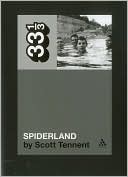

 |

|

The average rating for Slint's Spiderland based on 2 reviews is 3.5 stars.
Review # 1 was written on 2012-08-29 00:00:00 Matt Gough Matt GoughVery dry, not very detailed book about one of the most seminal, mysterious albums since punk. Still, when there's so little information around you're happy for all you can get. At least the author knows music enough to be able to discuss chord sequences and time-signatures (astonishingly rare among rock writers), and a few basic facts help put the album in context: that Slint rehearsed their arrangements meticulously/obsessively for 4 months prior to recording; that the vocals had never been put to the music before; that the album was recorded and mixed in 4 days, in few takes, with virtually no overdubs (in other words, while most musicians used multitracking, metronomes and digital editing to produce a simulacrum of rock music, Slint used the tools of rock - 4 guys in a room with bass, drums and 2 guitars - to produce something revolutionary). That said, I always hate the track-by-track thematic analyses that the writers of this series feel they have to indulge in, and there's way too much back-story about high school projects and the inferior first record (Tweez - about which the author seems to know, ironically, more than Spiderland). Still, I'd sift through another 100 pages of this just for a few more nuggets about those historic 4 days in a jingle-recording studio in Chicago. Spiderland, dude. Rock ends like this. |
Review # 2 was written on 2010-12-28 00:00:00 Steven Sullender Steven SullenderScott Tennent's entry into the 33 1/3 series opens with a family tree of sorts, a graphic organizer listing every band that each member of Slint has ever played in. What follows is a thorough and heartfelt love letter not just to Slint, but to the fruitful Midwest underground scene that they were a part of. I've read a few of these 33 1/3 books now, and Mr. Tennent's is the best-written one that I have yet encountered. He writes in a direct, unpretentious manner that reveals his deep, geeky love for his subjects and for the singular musical community which they took part in. He doesn't get too caught up in the technical aspects of recording, nor does he focus excessively on the cultish mythology of Slint that arose after their break-up. He affectionately describes the way that the band took elements of their punk and metal pasts and used them to create something singular and new. He marvels at the band member's modesty and obsessive work ethic, and he effectively breaks down why "Spiderland" is still an object of adoration and obsession for music fans two decades later. The book's one major flaw is not Tennent's fault at all. Brian McMahan, the driving force behind both "Spiderland"'s erudite, depressing-as-all-hell lyrics and the band's break-up shortly after the album's completion, did not make himself available for interview. Tennent and his primary interview subject (guitarist Dave Pajo) do a good job of filling in some of the blanks without speculating too much about McMahan's widely-rumored mental instability at the time. Still, McMahan's insight is sorely missed. Without it, the image of "Spiderland" that emerges in this book is thorough but still somewhat incomplete and elusive. I guess that's as it should be. A little sense of lingering mystery can only help one's appreciation of an album, especially one that is already as beguiling and dream-like as "Spiderland." |
CAN'T FIND WHAT YOU'RE LOOKING FOR? CLICK HERE!!!